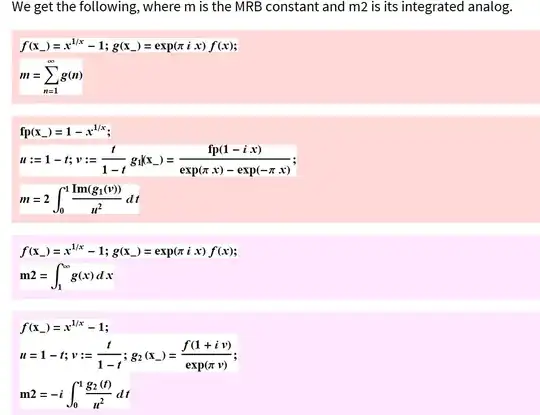What are some similarities between MRB=$\sum _{x=0}^{\infty } e^{i \pi x} \left(1-(x+1)^{\frac{1}{x+1}}\right) $ and M2= $\int_0^\infty e^{i \pi x} \left(1-(x+1)^{\frac{1}{x+1}}\right) dx$ in their proper integrals from (0 to 1)?
-
1This related question may help. – Тyma Gaidash Oct 11 '21 at 13:44
2 Answers
This is a perfect application for the Abel-Plana formula. The alternating series version would not work here, so the main definition of the formula will work.
$$\sum_{x\ge 1} f(x)=\frac{f(0)}2+\int_0^\infty f(x) dx+i\int_0^\infty\frac{f(ix)-f(-ix)}{e^{2\pi x}-1}dx$$
Now let $f(x)=(-1)^x\left(1-\sqrt[x+1]{x+1}\right):$
$$\sum_{x\ge 1} (-1)^x\left(1-\sqrt[x+1]{x+1}\right) =\frac{(-1)^0\left(1-\sqrt[0+1]{0+1}\right)}2+\int_0^\infty (-1)^x\left(1-\sqrt[x+1]{x+1}\right) dx+i\int_0^\infty\frac{(-1)^{ix}\left(1-\sqrt[ix+1]{ix+1}\right)-(-1)^{-ix}\left(1-\sqrt[-ix+1]{-ix+1}\right)}{e^{2\pi x}-1}dx\implies \sum_{x\ge 1} (-1)^x\left(1-\sqrt[x+1]{x+1}\right) =\int_0^\infty (-1)^x\left(1-\sqrt[x+1]{x+1}\right) dx+i\int_0^\infty\frac{(-1)^{ix}\left(1-\sqrt[ix+1]{ix+1}\right)-(-1)^{-ix}\left(1-\sqrt[-ix+1]{-ix+1}\right)}{e^{2\pi x}-1}dx\implies i\int_0^\infty\frac{(-1)^{ix}\left(1-\sqrt[ix+1]{ix+1}\right)-(-1)^{-ix}\left(1-\sqrt[-ix+1]{-ix+1}\right)}{e^{2\pi x}-1}dx =\text M_2+\text{MRB}$$
Let me think of something that may not require difficult radicals. See the link for the theorem’s information. Please correct me and give me feedback!
- 12,081
-
Using the surds might make it harder than what the community and I have done using the Abel-Plana formula but it would be interesting to see what it produces. The results in my answer started from that formula. – Marvin Ray Burns Oct 11 '21 at 14:19
-
1Here is what we came up with: https://math.stackexchange.com/questions/4191171/how-2-special-constants-are-related – Marvin Ray Burns Oct 11 '21 at 14:27
-
There is also the definition of $$\text{MRB}=\sum_{x=0}^\infty(-1)^x\big(x^\frac1x-1\big)$$ as seen here. This one is different from the one in your question though. – Тyma Gaidash Oct 11 '21 at 14:38
-
I could have messed up; they're supposed to be the same since Exp(pi n i) =(-1)^n, and starting with n= 0 instead of 1 changes the sign of the summand. That is $\text{MRB}=\sum_{x=1}^\infty(-1)^x\big(x^\frac1x-1\big) $ – Marvin Ray Burns Oct 11 '21 at 14:55
-
There is the definition also using Abel Plana in Wolfram Mathworld:$$\text{MRB}=\int_0^\infty \text{csch}(\pi x)\text{Im}\left(\sqrt[ix+1]{ix+1}\right)$$, so maybe we can use abel plana again on it? – Тyma Gaidash Oct 11 '21 at 16:47
-
@ Tyma Gaidas, I'm having trouble reproducing $\text{MRB}=\sum_0^\infty(-1)^x\big(\sqrt[x]x-1\big)=\int_0^\infty\lfloor x\rfloor d\left((-1)^x\big(\sqrt[x]x-1\big)\right)= 1+ \int_0^\infty\lfloor x\rfloor d\left((-1)^x\big(\sqrt[x]x-1\big)\right)=1+ \int_0^\infty \lfloor x\rfloor\left( (-1)^x x^\frac1x \frac{\ln(x)+1}{x^2}+i\pi (-1)^x\big(\sqrt[x]x-1\big)\right)dx=1+\int_0^\infty \lfloor x\rfloor(-1)^x \ln(x) x^{\frac1x-2}dx+ \int_0^\infty \lfloor x\rfloor(-1)^x x^{\frac1x-2}dx+ i\pi \int_0^\infty \lfloor x\rfloor (-1)^x\big(\sqrt[x]x-1\big)dx$ – Marvin Ray Burns Oct 11 '21 at 20:28
-
1Tyma Gaidash , it could be that $\text{MRB}=\sum_1^\infty(-1)^x\big(\sqrt[x]x-1\big)$ not $\text{MRB}=\sum_0^\infty(-1)^x\big(\sqrt[x]x-1\big)$ – Marvin Ray Burns Oct 11 '21 at 20:30
-
-
I thought this similarity between their proper integrals was worth mentioning. You can see it worked and alter it here.
- 301
